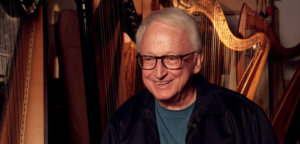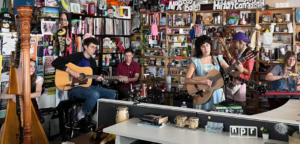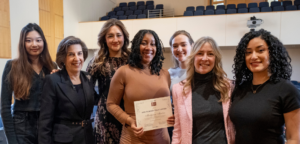The Third Latin American Itinerant Pedal Harp Workshop took place April 15 – 21, 2018 in Mexico City. This program is the result of a collaboration between Isabelle Moretti, Marisela González, and Mercedes Gómez, who aimed to “design a workshop that would consider the real needs of the students” in Latin America. Harp Column caught up with Isabelle after the workshop ended to find out more.
As a harpist from France, what inspired you to design a workshop specific to harpists in Latin America?
After few trips in Venezuela for “El Sistema,” and to Mexico where I met Mercedes Gómez, I became very aware of the opportunities that we French musicians have, with everything at our reach, while others have practically nothing. Of course I knew about this situation and I did not ignore it, but this gave me the opportunity to feel it in my own flesh and blood.
How did you get connected with Marisela and Mercedes?
I met Marisela in Brazil during a collaboration between the Conservatoire National Supérieur de Musique et de Danse de Paris and the Winter Festival in Campos do Jordão. Marisela was teaching there with me, and I was really impressed by her professionalism, kindness, and humility. Speaking with her about my strong desire to act in a concrete way, she spoke with me about Mercedes, whom I had already met at the World Harp Congress in Prague and knew all about the wonderful work she was doing with the harp students at the conservatory in Mexico.
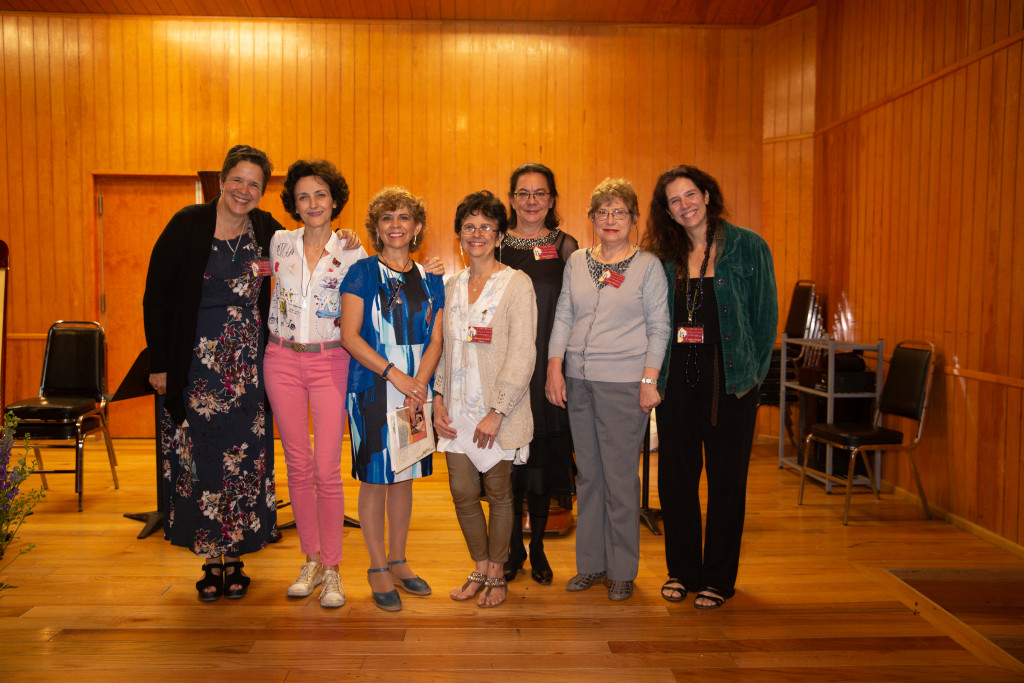
The teacher’s team, from left to right: Mercedes Gómez (Mexico), Isabelle Moretti (France), Artemisa Reyes (Mexico), Marisela González (Venezuela), Janet Paulus (USA/Mexico), Larisa Fedorova (Russia/Mexico), Cristina Braga (Brazil)
So how did this program come together?
The exact knowledge that these two teachers have of the situation they have experienced in their countries has been indispensable and highly appreciated. Therefore, after long talks, we decided together that the most useful tool would be to create an itinerant classical harp workshop. The concept of itinerant or travelling could allow young students from Latin America to easily attend, making it easier for them in time and travelling costs.
Can you give us some specifics about the workshop? How is it shaped for the needs of Latin American harpists?
Well, I’m not sure there are special needs for young Latin American harpists! They need exactly the same as all the students all over the world! In fact, what they really need are harps at home to practice and strings, and unfortunately, I can’t do a lot by myself. But I know it’s financially hard for them to attend masterclasses with foreign teachers, and for this, I can help!

I’d love to know a little bit more about harp accessibility in Latin America.
The traditional folk harp (in Venezuela and Colombia, the jarocha in Mexico, etc.) is a very present instrument in Latin America, but the “classical” harp has gone through difficulties to be well known, due to [shortages]: not enough instruments, few strings, few scores, but also a lack of concrete contacts with other countries in everything related to the pedagogical and musical field (and by that I mean all that is not on YouTube!).
Who else was involved in making this workshop possible?
Jakez François (from Camac Harps) has generously supported this project, collaborating by our side for all the [workshops], hosting the first and third edition: the Facultad de Música UNAM and the Conservatorio Nacional de Música in Mexico. And the Social Project PIM, with their teachers Celia and Claudio Moreira, hosted the second edition in Brazil.
What do you want people to know about the harp scene in Latin America?
What touches me the most is the deep commitment of some of these young students have to the music. They work as much they can, wasting time travelling in the bad traffic to be able to practice on a harp far away from where they live. The teachers are [extremely generous], letting them practice on their own harps at home or in orchestra when possible, even giving them the keys to their houses while they are out!
Music IS really the center of their lives and not only as an entertainment, or on the contrary, a focus only in preparing for competitions! I’m not saying that competitions are not good – of course they are! But when it’s possible to [also] feel love for the music itself, that makes a huge difference.
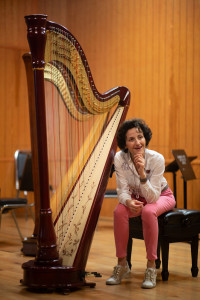
Can you share some thoughts on your philosophies as a harpist and as a teacher?
“To share, to help each other, to open our eyes and heart widely to the world…” This is the meaning, in my opinion, of our journey on this planet, even more so as artists.
So now that this workshop is over, how do you feel?
I gained so much love and heart smiles that I’m rich for my entire life! I literally felt in love with Latin America people: their human warmth, spirit, music, and history. It remains to discover their soul through all these young musicians, and I hope they will allow me to live this adventure with all of them as long as possible.







